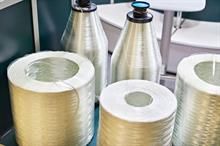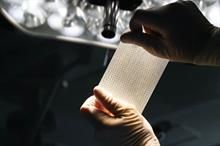
Conagen, the biotechnology innovator, has announced the development of a debondable textile adhesive made from high-performance materials sourced from sustainable and natural biomolecules.
Conagen's debondable adhesive offers a major application in the realm of reworkability during clothing production. Traditionally, when mistakes occur during manufacturing, it can lead to material wastage and additional production costs.
The reworkability aspect of Conagen's adhesive presents a game-changing solution for the clothing industry. It allows for quick and efficient correction of errors without the need to discard and waste valuable materials. Adjustments can be made by simply debonding the adhesive and the fabric components can be seamlessly reworked, resulting in improved production efficiency, reduced material waste, and significant cost savings for manufacturers.
Moreover, debonding textile fabric plays a vital role in textile recycling by enabling efficient material separation, preserving material quality, expanding recycling opportunities, and advancing the goals of a circular economy.
Traditional adhesives used in garment manufacturing often create a permanent bond, making it challenging to separate fabric components during recycling. Conagen's debondable adhesive not only drives sustainability through fabric recycling but also offers a practical and economical solution for optimising production processes in the clothing industry. The ability to debond and rework materials brings newfound flexibility and efficiency, benefiting manufacturers and the environment.
"Conagen's pioneering adhesive has unlocked new possibilities and opportunities. This groundbreaking development enables efficient material separation during reworking and recycling processes and preserves the integrity of textile fibres, ensuring their quality for future utilization," said Sara Johnson, senior materials scientist. "With the introduction of Conagen's adhesive, we are taking a significant stride towards achieving a more sustainable and environmentally responsible textile industry."
Having previously created debondable adhesives for other sectors, such as appliances, smartphones, cars, and more, Conagen identified the significant benefits such an adhesive could bring to the textile and clothing industry and tailored a new product specifically to its needs.
Adhesives and tapes are commonly used today in garment manufacturing, either alone or in combination with stitching. This is particularly evident in the manufacturing of women's underwear, where up to six layers of material are often glued together to achieve the desired fit and comfort. It is essential to bring attention to these modern manufacturing methods as they reflect the evolution of textile production.
Conagen’s new adhesive offering provides strength comparable to existing fabric adhesives but with the added feature of controlled debondability at end-of-life. Inspired by self-healing materials, Conagen utilises sustainable and natural ingredients to create high-strength debondable hot melt adhesives. Unlike traditional offerings, this new adhesive is designed with reversibility, exhibiting the strength of conventionally cured adhesives, with the added benefit of transitioning to a flowable material after heating.
Conagen’s high-strength debondable textile adhesive can be used for garments, but also extends to accessories and other soft goods applications. Furthermore, the technology is compatible with both natural and synthetic fibers and materials.
To develop sustainable debondable textile adhesives, Conagen leverages its precision fermentation technology, independent of plant source materials, to create more efficient and sustainable bio-based ingredients compared to chemically-synthesized versions.
"Conagen's fermentation technology is forging a path towards a more sustainable future, where the utilisation of sustainable biocompounds and biomaterials takes centre stage in propelling high-performance solutions that prioritise environmental consciousness,” said J McNamara, vice president of chemical applications.
The seam tapes market stood at $128 million in 2020. It was projected to exhibit a CAGR of 6.9 per cent between 2020 and 2025, making Conagen’s adhesive formulation lucrative for a supplier to distribute to clothing manufacturers.
Debondable adhesives have the potential to significantly impact the market by offering a more sustainable and efficient solution for fabric bonding. The ability to easily debond materials could lead to increased adoption of adhesive-based manufacturing techniques and open up new opportunities for textile reworking and recycling, thereby potentially expanding the market for debondable adhesive products.
Conagen’s hallmark in biotech specialty and industrial space lies in discovering applications from the platform of natural biocompounds and biomaterials, ushering in a new era of high-performing and sustainable materials.
“By harnessing the power of fermentation, Conagen is leading the charge in promoting greener alternatives and revolutionising industries with its commitment to sustainability and innovation,” said McNamara.
Conagen's commitment to green chemicals and sustainability has been greatly reinforced by its strategic partnership with Sumitomo Chemical. The collaboration represents a major step forward in their shared vision of developing biosolutions for a more sustainable future.
Fibre2Fashion News Desk (RR)

